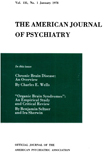Passive-Aggressive Personality Disorder: A Search for a Syndrome
Abstract
This paper presents data from a seven- to 15-year follow-up study of 100 patients hospitalized with a diagnosis of passive-aggressive personality disorder, who were compared with 50 matched controls with other psychiatric diagnoses. The clinical features of the subjects were remarkably homogeneous both on cross-sectional and longitudinal evaluations. Their psychopathology was most prominent in disturbances of interpersonal relationships and social behavior, affective reactions, and somatic complaints; some also had problems with depressive episodes and/or alcohol abuse. The clinical features were relatively stable over time, although some patients appeared to have improved with outpatient psychotherapy.
Access content
To read the fulltext, please use one of the options below to sign in or purchase access.- Personal login
- Institutional Login
- Sign in via OpenAthens
- Register for access
-
Please login/register if you wish to pair your device and check access availability.
Not a subscriber?
PsychiatryOnline subscription options offer access to the DSM-5 library, books, journals, CME, and patient resources. This all-in-one virtual library provides psychiatrists and mental health professionals with key resources for diagnosis, treatment, research, and professional development.
Need more help? PsychiatryOnline Customer Service may be reached by emailing [email protected] or by calling 800-368-5777 (in the U.S.) or 703-907-7322 (outside the U.S.).



